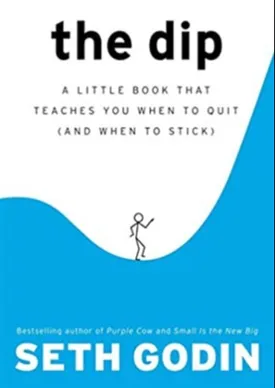Seth Godin’s “The Dip” is one of the most influential business books of the past decade. It has become a staple of many business professionals’ bookshelves and has inspired countless entrepreneurs and aspiring CEOs. In the book, Godin argues that “quitting before you’re done is the single most common mistake entrepreneurs make.” He believes that instead of quitting, it pays off to “be the best at something and to stay focused on the goal, instead of giving up too soon.
The Dip is based upon the idea that many people are often too eager to give up when the going gets tough. The logic is that, too often, entrepreneurs give up on projects when the “dip” in progress arrives, which could be a resulting “drop in energy, enthusiasm, or momentum.” This is when many entrepreneurs often make the costly mistake of wanting a quick exit.
Godin explains that in order to rise above the situations in which you experience the “dip”, you need to commit, invest and focus on the situation and have the necessary confidence to push through. He encourages people to avoid letting themselves get “safely off the path,” and instead consider how they can “win big” when they do decide to keep going. In this way, The Dip is all about recognizing and embracing the grind and “putting in the steep upfront investment in order to get the payoff at the end.”
Godin also emphasizes the importance of understanding your place in the market and having personal goals to strive for, rather than aiming for wide-scale success following the completion of a project. He explains that those who truly have vision have the “courage to ignore the Dip.” This means the ability to recognize when a smaller goal is achievable and to remain focused on the bigger goal, no matter what the risk.
Of course, this doesn’t mean that all kinds of effort are worth the same level of investment. Godin suggests that it is important to identify the “worthy” dips that will help reach success, as opposed to focusing on those that are likely to lead to a bigger loss in the end. He argues that “in the right context, quitting too early is often more costly than investing more and pushing through the dip.”
Overall, The Dip is very motivating, encouraging entrepreneurs to keep pushing and stay focused on their larger goals. Its focus on the need for perseverance and determination during rough times provides valuable insights forwould-be and experienced entrepreneurs alike, and it should remain an essential tool for anyone wanting to boost their long-term career success.

